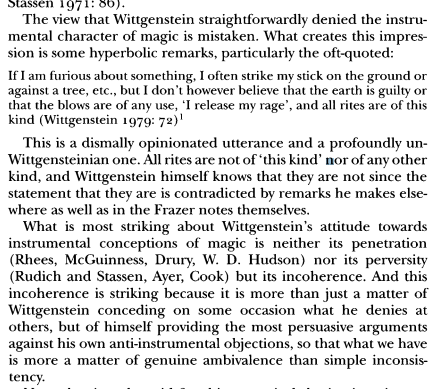I have, time and again in this book, emphasized that this is where the true difference between Wittgenstei n and Frazer lies: not in the latter’s belief that rites aim to achieve some end, but in the fact that he contends that such actions come about through a process of reasoning akin to hypothesis-forming and experimentation. It is the gratuitousness of the reasons Frazer gives for primitive observances – so ubiquitous in The Golden Bough – which stands in such stark contrast to the conception of natural piety. (p. 159)
Earlier on the same page he writes:
Thus, Frazer looks for reasons why the oak was so venerated (locating this in its association with the sky, the rain, the thunder, and, consequently, with Zeus), whereas Wittgenstein stresses the non-ratiocinative nature of this worship (‘no reason’).Frank Cioffi makes a similar point on pp. 155-156 of his book Wittgenstein on Freud and Frazer. Cioffi writes:
I wonder whether the kind that Wittgenstein had in mind (when he said that all rites are of "this kind") has been misunderstood. He obviously does not mean that all rites are ways of releasing rage (and no one thinks he means this). But must he be saying that all rites are ways of releasing some emotion? One thing to note about his reference to releasing his rage is that it is in quotation marks, presumably because this is an expression we use (and which he is quoting) but also because it is a figure of speech. Rage is not something that one can literally release. So he has not told us what kind of thing rites are, only given something figurative to associate or compare them with. Another thing to note is that this seemingly expressivist point is made in contrast to two alternatives: I might believe that the earth is guilty and deserves punishment or I might believe that beating the earth will be of some use. As Brian points out, Wittgenstein is not rejecting instrumentalism here. If he were then the bit about the earth's being guilty would not belong: punishing the guilty is not typically understood instrumentally. The contrast that Wittgenstein makes is not between instrumentalism and expressivism but between behavior based on belief and behavior that is more primal, which means basically behavior that is not based on belief or ratiocination. Such behavior can still be intended to bring something about, but it is based on or starts with some feeling. In short, it is not science. For example, if I try to kill my enemy by sticking pins in a doll then I am trying to bring something about, but on the basis of a sense that what is done to the likeness of my enemy must also be done to him. We can call this sense a belief if we like, but it isn't one that I have because I have thought about it or on the basis of observation. It is just the kind of thing that human beings naturally seem to think (or 'think'). If I thought about it for a moment I would see right away that it was groundless. Wittgenstein's point, I take it, is that it is with such groundless beliefs or senses or instincts that ritual begins. This is the kind of thing they are.

Witt on Frazer reminds me of Freud highlighting how all critters have to eat but only humans get into something like fine-dining with all of the aesthetic aspects in play.
ReplyDelete-dmf
Yes, it is a bit like that.
DeleteI can see the point of using quotation marks around think as you do toward the end so as to help distinguish the behavior in question from the propositional (I take it) but it might lead some to think that said behavior is lacking in seriousness in the sense that Frege spoke of the propositions uttered by an actor on stage. (There's a ritual Frazer would make complete nonsense of: the theater.)
ReplyDeleteI think of sticking pins in dolls as an extension of wishing someone harm, defacing their image is somewhere on that 'continuum'. Just another way of saying the same, so to speak. Then again, it might be an expression of not wanting to do anyone harm, a refraining through transference. Is that not the point of sacrifice? Different from scapegoating anyway.
I wanted to say that the behavior in question, ritual, is expressive of the human, but so is language, so that really says nothing much at all.
Anyway, it always good to be reminded, as Wittgenstein was kind enough to do, of the fact that no savage builds houses by stacking miniature logs while staring intently at the forest and chanting. (The cargo cult is different.)
Keep it up.
it might lead some to think that said behavior is lacking in seriousness
DeleteIt needn't lack seriousness, but it lacks reasoning. One way to put that might be to say that it isn't propositional. I don't mean that it's irrational or crazy.
I think of sticking pins in dolls as an extension of wishing someone harm, [...] Then again, it might be an expression of not wanting to do anyone harm, a refraining through transference.
Good point.
Interesting talk by Sanford on Freud and Kant, I think that Witt is trying to offer us instead of laws and such another way of seeing meaningful connections between behaviors and life-worlds that isn't self-conscious reasoning but isn't non-sense or madness.
ReplyDeletehttp://backdoorbroadcasting.net/2014/06/freud-and-philosophy/
-dmf
Yes, that sounds right. Thanks for the link.
Delete